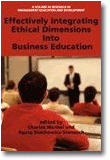
Effectively Integrating Ethical Dimensions into Business Education
Edited by:
Charles Wankel, St. John's University, New York
Agata Stachowicz-Stanusch, Silesian University of Technology, Poland
A volume in the series: Research in Management Education and Development. Editor(s): Agata Stachowicz-Stanusch, Canadian University Dubai. Wolfgang Amann, HEC Paris. Hamid H. Kazeroony, North-West University Business School.
Published 2011
Over the last decade, we have been witnessing a dramatic contrast between the CEO as a superhero and CEO as an antihero. The new challenge in business education is to develop responsible global leaders. Relatively little is known, however, about how management educators can prepare future leaders to cope effectively with the challenge of leading with integrity in a multicultural space. This volume is authored by a spectrum of international experts with a diversity of backgrounds and perspectives. It suggests directions that business educators might take to reorient higher education to transcend merely equipping people and organizations to greedily proceed, with dire effects on the preponderance of people, nations, our planet and the future. The book is a collection of ideas and concrete solutions with regards to how morality should be taught in a global economy. In the first part, the editors present reasons why management education for integrity makes up an important challenge in an intercultural environment. This book is an overview of a spectrum of approaches to developing moral character in business students in this epoch of dynamic technologies and globalization. Experts share approaches to sensitizing learners to integrity and its opposite in a wide variety of international cases and examples. The impact of colliding cultural differences on management education will be also parsed. With in-depth discussions of the influence of such factors as gender, ethnicity and academic performance the book looks comparatively at the implications for instructors in various cultural contexts. A wide variety of teaching approaches are explained with lengthy examples including ones leveraging humanities and storytelling.
CONTENTS
Acknowledgments. PART I: INTRODUCTION. Management Education for Morality in the Era of Globalization, Charles Wankel and Agata Stachowicz-Stanusch. PART II: NATIONAL CULTURE’S IMPORTANCE IN BUSINESS ETHICS EDUCATION. Developing Morality in Business Students: Insights From Arab-Islamic Culture and Business Experience, Abdullah Al-Beraidi. A Proposal for the Structure of Moral and Ethical Education of University Students and Adult Businesspeople: What to Teach and Why, Romie Littrell. PART III: MANAGEMENT EDUCATION FOR MORALITY IN BUSINESS IN EMERGING MARKETS. Ethical Management Education in Emerging Economies: A View From Brazil, Gazi Islam. Action Learning in Participatory Practice: The Case of Social Enterprise in Korea, Jae Eon Yu. The Influences of Ethical Perception Among Malaysian University Students and its Implications on Curriculum Development, Jo Ann Ho, Siew Imm Ng, and Keng Kok Tee. PART IV: ENSURING INTEGRITY AT WORK THROUGH BUSINESS ETHICS EDUCATION. Teaching Business Students Aware to Be Passionate About Ethical Sustainable Development, Ernestina Giudici, Luisa Varriale, Michela Floris, and Silvia Dessi. Reflective Organizations and the Inner Work of Leaders, Karen Fiorini and Avraham Cohen. Using the Humanities to Teach Values-Based Leadership, Mark Ahn and Larry Ettner. If Plato Led a Fortune Global 500 Firm: Lessons From His Republic, Martin Lecker. The Disconnect Between Business Ethics Education and Putting it Into Practice: How Do We Fix It? Leanna Lawter, Grace Guo, and Tuvana Rua. Towards a Storytelling Ethics for Management Education, Kenneth Mølbjerg Jørgensen and Anete M. Camille Strand. About the Authors.
-
Paperback978-1-61735-578-3
Web price: $45.04 (Reg. 52.99)
-
Hardcover978-1-61735-579-0
Web price: $80.74 (Reg. 94.99)
- eBook9781617355806

- BUS008000 - BUSINESS & ECONOMICS: Business Ethics
- BUS108000 - BUSINESS & ECONOMICS: Research & Development
-
 Advancing African Knowledge Management and Education
Advancing African Knowledge Management and Education
-
 Anti-Corruption in Management Research and Business School Classrooms
Anti-Corruption in Management Research and Business School Classrooms
-
 Humanistic Values from Academic Community Perspective
Humanistic Values from Academic Community Perspective
-
 Management and Business Education in the Time of Artificial Intelligence
The Need to Rethink, Retrain, and Redesign
Management and Business Education in the Time of Artificial Intelligence
The Need to Rethink, Retrain, and Redesign
-
 Phronesis in Business Schools
Reflections on Teaching and Learning
Phronesis in Business Schools
Reflections on Teaching and Learning
-
 Principles of Responsible Management Education (PRME) in the Age of Artificial Intelligence (AI)
Opportunities, Threats, and the Way Forward
Principles of Responsible Management Education (PRME) in the Age of Artificial Intelligence (AI)
Opportunities, Threats, and the Way Forward
-
 The Ph.D. Mindset
Decoupling Passion from Research
The Ph.D. Mindset
Decoupling Passion from Research

